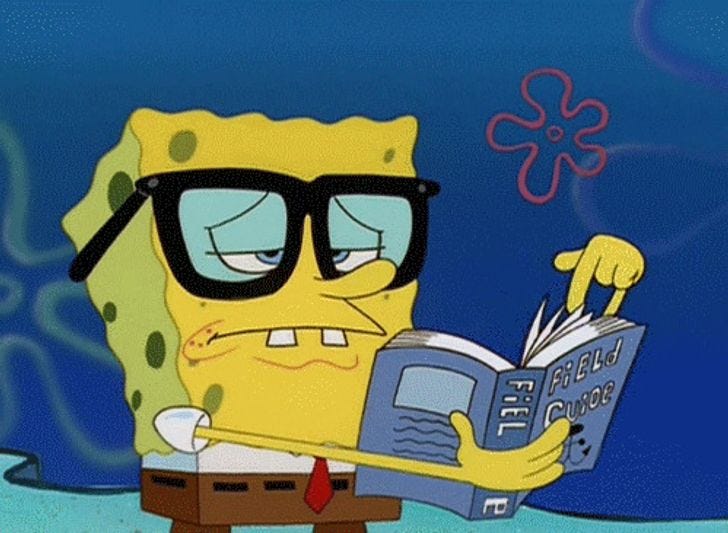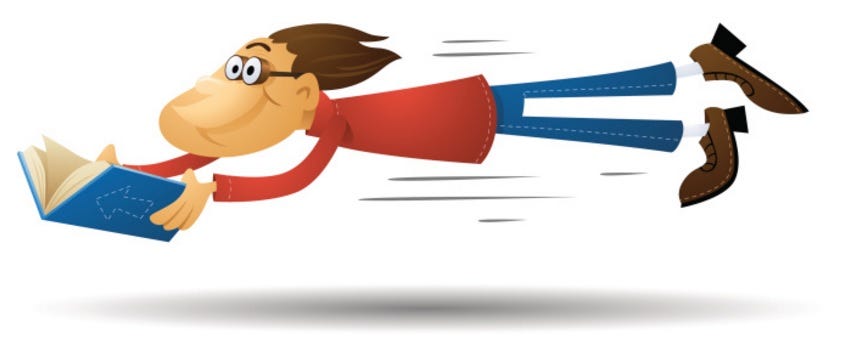Slow reading vs. fast reading: Which is better?
On speed reading, comprehension, and internalizing.
Hey fam,
Been a minute I wrote to you. I’ve missed two days of the 30-day Writing Challenge I’m on. Not to worry, though, I promise to make it up.
Notice things look a bit different?
Well, I’m rebranding my newsletter. Yay! 🥳
Anyways, I want to say “Thank You” to the 25 subscribers on this newsletter. You guys rock!
And if you’re a regular reader, and you’re not yet subscribed, I’d be glad if you did. Enter your email below.
And I’d also love you to support my work by sharing it with your network. Please encourage them to subscribe as well.
Let’s reach the world together!
That said, here’s what I’ve got for today. We dive right in on 3, 2, 1…

Recently, I made a post on my WhatsApp status dishing out unsolicited advice to my contact.
It was something of this sort;
“Learn to be patient while reading. Patiently move through words, sentences, paragraphs, and the entire thought process. Don’t be in a hurry to scroll to the next thing. Make a practice of paying deliberate attention.”
Little did I know that I was wrong with my submission, despite my many ponderings before coming to that conclusion. Thanks to my brother and Sunkanmi Samuel, both of them pointed out the flaw in my claim; that reading speed had little to do with comprehension.
In fact, Samuel noted that research proves that fast readers have better comprehension. I was surprised to hear that, but I couldn’t refute the argument he tabled. He described how meditation makes writing purposeful to any reader, and I couldn’t agree more.
Well, to satisfy my curiosity and listen to that part of me that wanted to prove Sam wrong, I ran a check on Google. And voila, several publications show a correlation between fast reading and higher comprehension.
Eventually, I found a piece that answered all my questions and explained what you need to know about reading speed. It was quite an eye-opener for me. What stood out for me from the piece is that not all words contribute to the meaning of a sentence. So, when reading fast, the brain automatically fills the gap in some places instead of actually reading the words.
Another interesting finding was that slow reading allows the brain to paint vivid images while reading, which is a prerequisite for daydreaming and losing attention. On the other hand, speed reading helps the mind focus on the piece at hand.
(Read the full article here)

Apparently, the issue I meant to address originally was internalizing, not reading speed. Then, maybe a bit of attention span too.
Comprehension comes from internalizing the thoughts communicated in a piece. Whether at a fast pace or slowly, reading does not guarantee comprehension. Maybe speed reading positions one better for comprehension because it involves paying more attention. But, even then, it’s until one gives thought to the things read before one can fully comprehend them.
Another factor that we must yet consider in this discourse on reading and comprehension is the technicality of the material. And maybe we can merge the technical prowess (This is a non-word for sharp or bright) of the reader’s brain to this point.
Tricky and complex materials require that the reader follow an intricate thought pattern to arrive at the writer’s submission in your mind. Connecting the dots sometimes requires that you slow down and pay particular attention to certain sentences, analogies, inferences, and references.
It’s like following a movie series like The Witcher or The Lord of the Rings. While fast reading would get you to consume all the information you need, many times, it takes having a second look at things (a slower reading) to make the needed connections in your mind.
Here’s what you should pick from all of this;
Read at a pace that’s comfortable for you. For example, Sam says each person should read the same way they talk.
You can train yourself to read faster.
You don’t have to jump to conclusions after the initial reading. Don’t be a Daniel Regha.
You’re allowed to take out time to ponder on what you’ve read. However, Sam advises that you pen down what you make of a piece, specific portions, or its entirety after you’re done reading. It would help you assess whether you’ve done justice to the material.
Treasure internalizing thought patterns over reading speed.
Alright, there goes my dazzling thought process. I’m feeling myself. 😄🙌😅🌚🙌
Unto the next.
Hakuna Matata 🌹.
What can you make of this piece?
I look forward to engaging your comments below.
If you like this piece, you can subscribe to the newsletter, and drop a heart



Awesome work here. You got your facts right.
Absolutely beautiful take man. You did a lot of justice with this piece. It's obviously well researched, well thought through and well written. I love the balance of it, and the conclusions you drew.